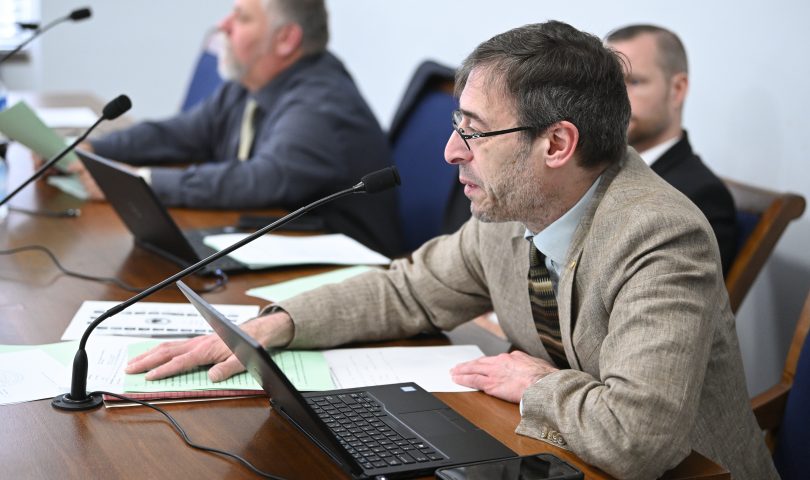MORGANTOWN — Cities would be required to hold their municipal elections on the same days as statewide primary or general elections under a bill approved by the House Political Subdivisions Committee on Wednesday.
Under a separate bill also OK’d by the committee, cities could establish outdoor refreshment areas where people could sip alcoholic beverages while they sit or stroll.
Both bills were lead-sponsored by Morgantown delegates.
Last year, the Legislature passed a bill — HB 4353, the Voter Turnout Act — that allowed cities to align their elections with those dates if they wished to and they worked out the details and costs with the county clerk’s office.
This bill, HB 2782, makes it mandatory.
Committee counsel and Delegate Evan Hansen, D-Monongalia, highlighted a problem in the bill, which was confirmed by Donald Kersey, secretary of state’s office general counsel.
The bill called for the change to take effect retroactively, July 1, 2022. But the state Constitution forbids passing a law after an official has been elected that extends that official’s term of office.
Counsel and Kersey said 105 of the state’s 231 municipalities have elections this year, while the rest have them next year. Morgantown’s, for instance, is set for April 25 this year.
The date in the bill would unconstitutionally extend the terms of all those officials, they said.
So Delegate Geoff Foster, R-Putnam, offered an amendment to change the effective date to Jan. 1, 2026, to account for the few cities, such as Morgantown, where city council members serve four-year terms.
Committee counsel said this would shorten the terms of those officials whose terms would expire in 2027 or 2028, but that’s not unconstitutional.
Hansen raised concerns that the bill doesn’t address such matters as cost sharing with the counties (code just mandates that they share costs), or whether the city election would appear on the same ballot as the county ballot, or what happens when city wards or precincts don’t correspond with county precincts.
“I think the details matter here,” he said.
Counsel said in cities that already hold elections in May and November, they share poll workers and polling places and the city items appear at the end of the county ballot. Kersey said dozens of cities have the precinct issue but didn’t supply an answer for how it’s solved — leaving the implication it gets worked out locally.
The committee approved the bill in a voice vote, with Hansen supplying the only audible vote against. His Morgantown colleague, Republican Geno Chiarelli, is lead sponsor. It goes next to Judiciary.
Outdoor refreshment areas
Hansen is a co-sponsor of HB 2985, which allows a city to designate one or more outdoor refreshment areas for the sale, service and consumption of alcoholic beverages. His Morgantown Democratic colleague John Williams is lead sponsor and Monongalia County Republican Joe Statler is a co-sponsor.
Before designating an area, the city must receive an application from state-licensed alcohol permit holders within the area that includes a map of the proposed area. The Alcohol Beverage Control Commission would review and approve applications.
The area would be a maximum of 640 acres for a city of more than 50,000 residents; 320 acres for a smaller city.
A city of more than 50,000 could have a maximum of six areas with at least four permit holders in each area. Smaller cities could have three areas with at least two permit holders in each.
The bill allows for areas for fairs, festivals and charitable special events.
The bill includes a sunset requiring the cities to review and end or renew the areas.
Committee counsel said many cities have establishments with outdoor dining areas but patrons must stay within the fenced or railed section. The bill would allow them to stroll within the entire refreshment area.
Members defeated a proposed amendment to the bill that would have required every permit holder within a proposed area to submit an identical map to ABCC and pay a $1,000 application fee.
The bill passed in a voice vote with no dissent, and goes to Judiciary.
TWEET David Beard @dbeardtdp
EMAIL dbeard@dominionpost.com




